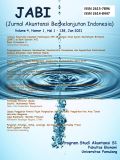Corporate Social Responsibility, Konservatisme Akuntansi, Timeliness dan Earning Rensponse Coefficient dengan Leverage sebagai Variabel Moderasi
DOI:
https://doi.org/10.32493/JABI.v5i1.y2022.p107-121Keywords:
Earning response coefficient, corporate social responsibility, accounting conservatism, timeliness, leverageAbstract
The aim of this research is to determine the effect of corporate social responsibility, accounting conservatism and timeliness and then leverage it as a moderate variable toward earning response coefficient in consumer goods sub-sector manufacturing companies that are listed on the Indonesia Stock Exchange (IDX) during 2016-2019. This research is a quantitative study with 28 total samples which is there are 112 data researched. Based on the T-test it result is known that the accounting conservatism variable and leverage-moderated corporate social responsibility variable affect toward earning response coefficient. The timeliness variable and leverage-moderated timeliness have a negative influence on the earning response coefficient. Meanwhile, the corporate social responsibility variable and the leverage-moderated accounting conservatism are not affected by the earning response coefficient
References
Ady, S. U., dan Mulyaningtyas, A (2017). Eksplorasi Tingkat Efisiensi Pasar Modal Indonesia Studi Kasus di Bursa Efek Indonesia. Jurusan Manajemen Fakultas Ekonomi Universitas Dr. Budi Soetomo Surabaya.
Anoraga, Pandji dan Pakarti, Piji. (2001). Pengantar Pasar Modal. Jakarta: Rineka Cipta.
Brigham, F. E., & Houston, F. J. (2015). Fundamentals Of Financial Management (Concise Ed). South Western, Cengage Learning.
Cho, Jang Youn dan Kooyul Jung, 1991. “Earnings Response Coefficient: A Synthesis of Theory and Empirical Evidenceâ€, Journal of Accounting Literatur. Vol. 10, pp. 85-116
Dewi, I. G. A. R. P., & Idawati, P. D. P (2017). Pengaruh Likuiditas Terhadap Ketepatanwaktuan Pelaporan Keuangan dan Dampaknya pada Earning Response Coefficient. Dalam Jurnal Ilmiah Akuntansi dan Bisnis Volume 2 No 1 Universitas Pendidikan Nasional.
Fauzan, M & Purwanto, A (2017). Pengaruh Pengungkapan CSR, Timeliness, Profitabilitas, Pertumbuhan Perusahaan dan Risiko Sistematik terhadap Earning Response Coefficient. Diponegoro Jurnal of Accounting Vol. 6 No. 1 Tahun 2017.
Givoly, D., dan C. Hayn, (2000). The Changing Time-Series Properties of Earnings, Cash Flows and Accruals: Has Financial Reporting Become More Conservative?. Journal of Accounting and Economics 29, pp.287-320.
Kurnia, dkk (2019). Pengaruh Pengungkapan Corporate Social Responsibility, Good Corporate Governance, Ukuran Perusahaan dan Profitabilitas Terhadap Earning Response Coefficient. Dalam E-JRA Vol. 08 No. 01 Fakultas Ekonomi dan Bisnis Universitas Islam Malang.
Mahlia, M., Apriliana, R., & Holiawati, H. (2020). Pengaruh Likuiditas, Leverage Dan Profitabilitas Terhadap Agresivitas Pajak (Studi Perusahaan Manufaktur yang terdaftar di BEI Tahun 2013-2017). PROCEEDINGS UNIVERSITAS PAMULANG, 1(1), 1-8.
Mosa, F. K. W. R, dkk (2019). Pengaruh Pengungkapan Corporate Social Responsibility, Timeliness, Debt to Equity, Terhadap Earning Response Coefficient (Study Empiris Perusahaan Manufaktur yang Terdaftar di BEI Periode 2015-2017). Dalam E-JRA Vol. 08 No. 01 Fakultas Ekonomi dan Bisnis Universitas Islam Malang.
Natsir, Recky S. E (2018) Pengaruh Leverage dan Persistensi Laba terhadap Earning Response Coiefficient. Skripsi Fakultas Ekonomi Universitas Islam Indonesia, Yogyakarta.
PP No. 47 Tahun 2012 tentang tanggung jawab sosial dan lingkungan perseroan terbatas. Tersedia dalam https://peraturan.bpk.go.id/
Sari, R. Y, (2018). Pengaruh Profitabilitas, Risiko Sistematis, Leverage, dan Corporate Social Responsibility (CSR) Terhadap Earning Response Coefficient (ERC) (Study Pada Perusahaan Perbankan Yang Terdaftar Di Bursa Efek Indonesia Periode 2014-2017). Skripsi Akuntansi Syariah Fakultas Ilmu Ekonomi dan Bisnis Islam Universitas Islam Surakarta.
Sartono, Agus, (2014). Manajemen Keuangan Teori dan Aplikasi. Edisi 4 Cetakan Ke 7. BPFE, Yogyakarta.
Savitri, E (2016) Konservatisme Akuntansi Cara Pengukuran, Tinjauan Empiris dan Faktor-Faktor yang Mempengaruhinya. Yogyakarta: Pustaka Sahila Yogyakarta.
Scott, W. R. (2006). Financial Accounting Theory, Prentice-Hall. Inc, Toronto
Yusma, N., & Holiawati, H. (2019). INVESTMENT RISK, INVESTMENT OPPORTUNITY SET DAN RETURN SAHAM. JABI (Jurnal Akuntansi Berkelanjutan Indonesia), 2(3), 393-406.
UU No. 8 Tahun 1995 tentang pasar modal. Tersedia dalam https://www.ojk.go.id/
Wahyuni, A (2019), Pengaruh Persistensi Laba, Struktur Modal dan Corporate social Responsibility (CSR) terhadap Earning Response Coefficient (ERC). Skripsi Fakultas Ilmu Administrasi Universitas Brawijaya.
Watts R.L. (2003). “Conservatism in Accounting Part I: Explanations and Implications.†Working Paper. University of Rochester
Website resmi BEI https://www.idx.co.id/
Willjayanti, D. (2012). Pengaruh Struktur Modal dan Kualitas Audit Terhadap Earning Response Coefficient.
Downloads
Published
Issue
Section
License
Authors who publish with this journal agree to the following terms:
- Authors retain copyright and grant the journal right of first publication with the work simultaneously licensed under a Creative Commons Attribution License that allows others to share the work with an acknowledgement of the work's authorship and initial publication in this journal.
- Authors are able to enter into separate, additional contractual arrangements for the non-exclusive distribution of the journal's published version of the work (e.g., post it to an institutional repository or publish it in a book), with an acknowledgement of its initial publication in this journal.
- Authors are permitted and encouraged to post their work online (e.g., in institutional repositories or on their website) prior to and during the submission process, as it can lead to productive exchanges, as well as earlier and greater citation of published work (See The Effect of Open Access)

This work is licensed under a Creative Commons Attribution-ShareAlike 4.0 International License.


 PUBLICATION ETHICS
PUBLICATION ETHICS FOCUS AND SCOPE
FOCUS AND SCOPE EDITORIAL TEAM
EDITORIAL TEAM REVIEW PROCESS
REVIEW PROCESS CONTACT US
CONTACT US AUTHOR GUIDELINES
AUTHOR GUIDELINES




